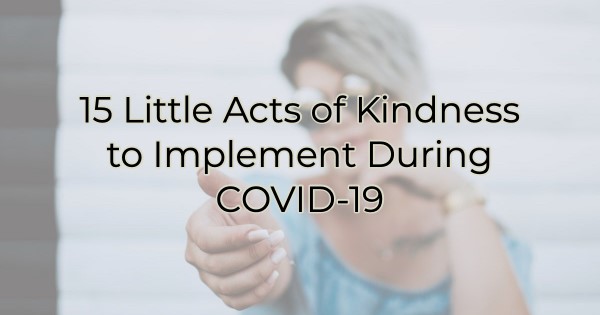15 Little Acts of Kindness to Implement During COVID-19

Most of us probably think of ourselves as nice people. Being told to be kind seemed like a no-brainer. But being kind is more than just being nice.
I was listening to Dave Ramsey this morning and he told everyone to calm down. Our misbehavior is largely due to fear and fear stamps out hope, something we all really need now. He, too, talked about being kind.
If you're a business leader in the community, it's even more important you let kindness rule. One reason is that kindness restores hope. The other is that people want to do business with those they know, like, and trust. If you remember kindness first, you'll be more likable and trustworthy.
Kindness is a lot more nuanced than “nice.” Here are several ideas on how you can be kind to the people in your life and spread that in your community.
1. Stop trying to fix people. You have not been elected pandemic czar. Protect yourself. Make wise decisions. Educate people but don't be a warden to other adults.
2. Tip higher than you usually would. People who are doing these jobs aren’t doing them for their health, especially not during a pandemic. Even if you're worried about your own business, show your appreciation. That sort of thing has a way of coming back to you.
3. Don't make anyone feel like a burden, not your kids, not elderly relatives, not strangers.
4. Smile and make eye contact.
5. Ask how people are and listen to their answers.
6. Contact distant friends and family, especially your extroverts. The shelter-in-place orders are harder for some people than others.
7. Share beautiful pictures on social media without lamenting what you're missing. Help people enjoy them for the beautiful moments they were. Tell the story behind them.
8. Don't hoard. We are not in--nor are we in danger of--being under martial law. Our cultural fascination with post-apocalyptic TV shows and movies has skewed our reality. When you walk into a grocery store, don't envision yourself as a character in The Walking Dead. There's enough for everyone. We're not locked down. If you run out of something, and people aren't hoarding, you should be able get what you need.
9. Give of your knowledge. If you are an expert in a certain area whether professionally or as a hobby, consider sharing your knowledge for free--or nearly so--with others on social media.
10. Share your talent. If you have a special talent such as artistry, music, or writing, share that on social media. If you're good at sports, share some tips.
11. Create an activity for kids to do and livestream it on social media for parents struggling to fill their children’s time.
12. Read to someone over the phone or on FaceTime. Children and adults enjoy stories.
13. “Visit” a few nursing home resident on FaceTime. Contact the nursing home administrator and ask if they think some of the residents would be interested in that. Many nursing homes are currently requiring residents to stay in their rooms. They can't even come out into the public areas. Even meals are being delivered to their rooms. These folks may be looking to have some outside conversation.
14. Choose someone who has been mean to you or difficult in the past. Reach out to them and share a good memory.
15. Send someone chocolates, a meal, or some little item just because. Help them understand how to order offline or better yet, do it for them.
Finally, encourage others to follow suit. You can do so by posting what you're doing every day to be kind. You can journal about it or you can share stories about what happens when you exercise your “be kind” muscle.
It sounds a little hokey at first but there are a lot of people who are extremely afraid right now. Being kind can have ripple effects on the community. When many people feel good about things that are happening, they are more likely to have hope in the future. Hope (and faith) is what we need to drive the economic revitalization we’ll need after this pandemic is over.
Christina R. Metcalf (formerly Green) is a marketer who enjoys using the power of story and refuses to believe meaningful copy can be written by bots. She helps chamber and small business professionals find the right words when they don’t have the time or interest to do so. Christina hates exclamation points and loves road trips. Say hi on Twitter or reach out on Facebook.

